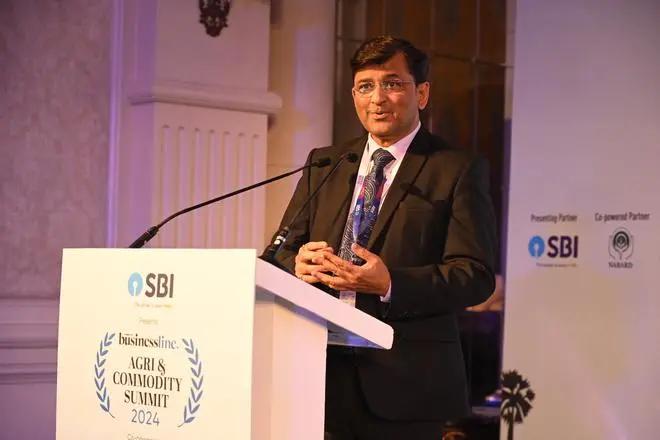Private investment in the agricultural sector needs to be ramped up five-fold to some 10 per cent by 2030, according to Vijay Paul Sharma, Chairman, Commission for Agriculture Costs and Prices in the Agriculture Ministry.
Currently 82 per cent of investment in the sector is from farmer households, 15-16 per cent from the public sector, while “pure” corporate sector investment is less than 2 per cent.
“I don’t think any sector can grow with private sector investment of just 2 per cent. We must take this to 5 or 10 per cent,” Sharma said, while speaking at the inaugural session of the Agri & Commodity Summit 2024 organised by businessline.
According to him, there are stumbling blocks and policy constraints. But the role of the public sector, the Central Government, and state governments is to create enabling policy environments. If there is need to incentivise, one can look at it.
“The core issue is to have an enabling environment for private investment so that it is worthwhile for investors,” Sharma said.
Look at adjacencies
According to him, farmers should also look at sectoral adjacencies. For instance, a push towards ethanol blending opens up new opportunities in the sugarcane sector, while use of maize for ethanol blending is another area that can now be explored by farmers.
Domestic ethanol blending has led to foreign exchange savings to the tune of ₹24,300 crore, as per Central Government data. In FY23, ethanol production was 500 cr litres, against 1,35,136 cr litres in 2013-14.
Import dependency across food-grains and pulses, which was a high 25-26 per cent around 2015-16 or even 2016-17, is down at present.
“Self-sufficiency in pulses is a success story. We imported just 3 million tonnes last year (FY23), as against 6 million tonnes in 2015-16 or 2016-17,” Sharma said.
Imposing import duty on certain items to ensure remunerative prices for Indian farmers across those categories was a “bold decision” by the Centre.
Integrated Approach

Shantanu Pendsey, Chief General Manager, SBI | Photo Credit: Photo: Bijoy Ghosh
According to Shantanu Pendsey, Chief General Manager, SBI, integrated farming models, whereby farmers get credit for multiple complementary activities (to farming) are available and this ensures “round the year income for them”.
FPOs across the country should be strengthened, while collectives need to be pushed. “Democratisation of credit and insurance is required in farming,” he said, adding that there should be a focus to “move producers to processors”.
“A 10 per cent increase in formal credit can lead to an at least 1 per cent increase in agri yield, which will have a positive impact on the GDP,” he said.
Pendsey added, climate change and its impact is a reality, that hits small and marginal farmers the most.
Indian Agriculture at Crossroads
According to Raghuvir Srinivasan, Editor, businessline , Indian agriculture is at a crossroads, with farmers having advanced technologies at their disposal, while facing problems of climate change at the same time.
Foodgrain production in 2022-23 was 330 million tonnes, up 30 per cent in the past decade.
“But this year, the problems of climate change are really upon us. The Agriculture Ministry has estimated an over 3 per cent fall in Kharif production. The Rabi season is also facing problems with the storage level in major reservoirs dropping below 60 per cent of capacity,” he said.
South India is bearing the brunt of the El Nino, which will continue till June. Storage in the peninsular region is below 40 per cent and the crop situation in Karnataka and Andhra Pradesh is worrisome.
Edible oil imports continue to be a concern, with India spending over Rs 1.25 lakh crore.
“The Ukraine war and climate change have brought to the fore the issue of food security. It has resulted in India taking a slew of measures, from curbing exports of wheat and rice, clamping stock limits, and resorting to open market sale of wheat and rice,” he said, adding that the country is taking care of the needs of its neighbours and other vulnerable countries.




Comments
Comments have to be in English, and in full sentences. They cannot be abusive or personal. Please abide by our community guidelines for posting your comments.
We have migrated to a new commenting platform. If you are already a registered user of TheHindu Businessline and logged in, you may continue to engage with our articles. If you do not have an account please register and login to post comments. Users can access their older comments by logging into their accounts on Vuukle.